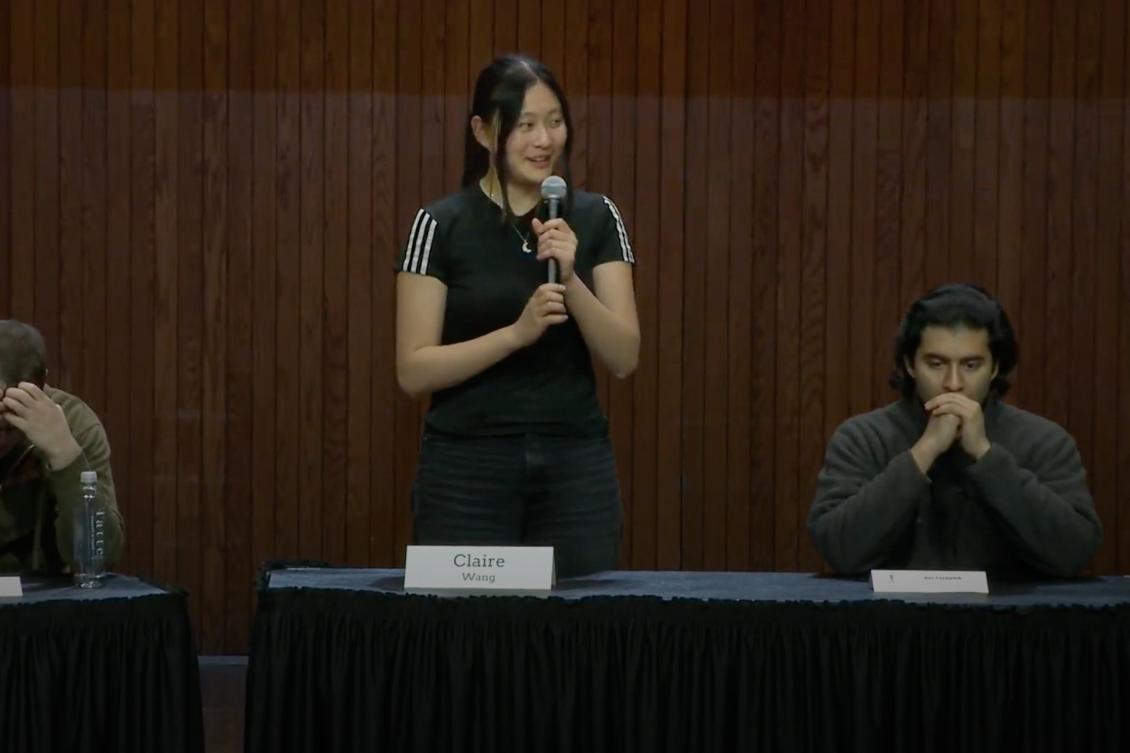3 Questions: Claire Wang on training the brain for memory sports

On Nov. 10, some of the country’s top memorizers converged on MIT’s Kresge Auditorium to compete in a “Tournament of Memory Champions” in front of a live audience.
The competition was split into four events: long-term memory, words-to-remember, auditory memory, and double-deck of cards, in which competitors must memorize the exact order of two decks of cards. In between the events, MIT faculty who are experts in the science of memory provided short talks and demos about memory and how to improve it. Among the competitors was MIT’s own Claire Wang, a sophomore majoring in electrical engineering and computer science. Wang has competed in memory sports for years, a hobby that has taken her around the world to learn from some of the best memorists on the planet. At the tournament, she tied for first place in the words-to-remember competition.
The event commemorated the 25th anniversary of the USA Memory Championship Organization (USAMC). USAMC sponsored the event in partnership with MIT’s McGovern Institute for Brain Research, the Department of Brain and Cognitive Sciences, the MIT Quest for Intelligence, and the company Lumosity.
MIT News sat down with Wang to learn more about her experience with memory competitions — and see if she had any advice for those of us with less-than-amazing memory skills.
Q: How did you come to get involved in memory competitions?
A: When I was in middle school, I read the book “Moonwalking with Einstein,” which is about a journalist’s journey from average memory to being named memory champion in 2006. My parents were also obsessed with this TV show where people were memorizing decks of cards and performing other feats of memory. I had already known about the concept of “memory palaces,” so I was inspired to explore memory sports. Somehow, I convinced my parents to let me take a gap year after seventh grade, and I travelled the world going to competitions and learning from memory grandmasters. I got to know the community in that time and I got to build my memory system, which was really fun. I did a lot less of those competitions after that year and some subsequent competitions with the USA memory competition, but it’s still fun to have this ability.
Q: What was the Tournament of Memory Champions like?
A: USAMC invited a lot of winners from previous years to compete, which was really cool. It was nice seeing a lot of people I haven’t seen in years. I didn’t compete in every event because I was too busy to do the long-term memory, which takes you two weeks of memorization work. But it was a really cool experience. I helped a bit with the brainstorming beforehand because I know one of the professors running it. We thought about how to give the talks and structure the event.
Then I competed in the words event, which is when they give you 300 words over 15 minutes, and the competitors have to recall each one in order in a round robin competition. You got two strikes. A lot of other competitions just make you write the words down. The round robin makes it more fun for people to watch. I tied with someone else — I made a dumb mistake — so I was kind of sad in hindsight, but being tied for first is still great.
Since I hadn't done this in a while (and I was coming back from a trip where I didn’t get much sleep), I was a bit nervous that my brain wouldn’t be able to remember anything, and I was pleasantly surprised I didn’t just blank on stage. Also, since I hadn’t done this in a while, a lot of my loci and memory palaces were forgotten, so I had to speed-review them before the competition. The words event doesn’t get easier over time — it’s just 300 random words (which could range from “disappointment” to “chair”) and you just have to remember the order.
Q: What is your approach to improving memory?
A: The whole idea is that we memorize images, feelings, and emotions much better than numbers or random words. The way it works in practice is we make an ordered set of locations in a “memory palace.” The palace could be anything. It could be a campus or a classroom or a part of a room, but you imagine yourself walking through this space, so there’s a specific order to it, and in every location I place certain information. This is information related to what I’m trying to remember. I have pictures I associate with words and I have specific images I correlate with numbers. Once you have a correlated image system, all you need to remember is a story, and then when you recall, you translate that back to the original information.
Doing memory sports really helps you with visualization, and being able to visualize things faster and better helps you remember things better. You start remembering with spaced repetition that you can talk yourself through. Allowing things to have an emotional connection is also important, because you remember emotions better. Doing memory competitions made me want to study neuroscience and computer science at MIT.
The specific memory sports techniques are not as useful in everyday life as you’d think, because a lot of the information we learn is more operative and requires intuitive understanding, but I do think they help in some ways. First, sometimes you have to initially remember things before you can develop a strong intuition later. Also, since I have to get really good at telling a lot of stories over time, I have gotten great at visualization and manipulating objects in my mind, which helps a lot.

